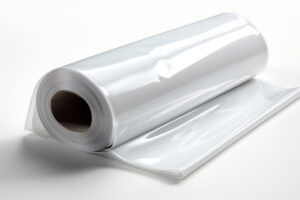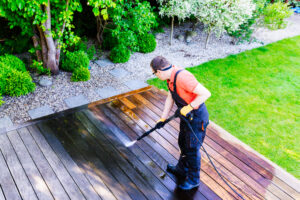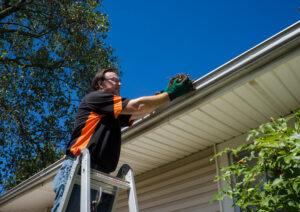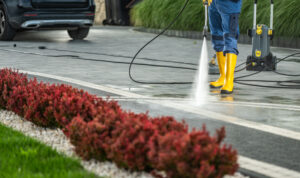Look, I’ve been getting asked about this constantly, and honestly, most people have no clue there’s even a difference. They use these terms like they mean the same thing, then wonder why their driveway still looks terrible after spending a weekend with a rented pressure washer.
It’s All About the Hot Water
The whole thing comes down to temperature. Pressure washing shoots cold water at stuff. Power washing heats that water up to about 200 degrees first. Sounds simple, but that heat makes a world of difference.
When you blast something with cold water under high pressure, you’re basically just hitting it really hard with water. Sometimes that’s enough to knock dirt loose, sometimes it isn’t. But when you heat that water up, something interesting happens – it starts breaking down oils and grease instead of just pushing them around.
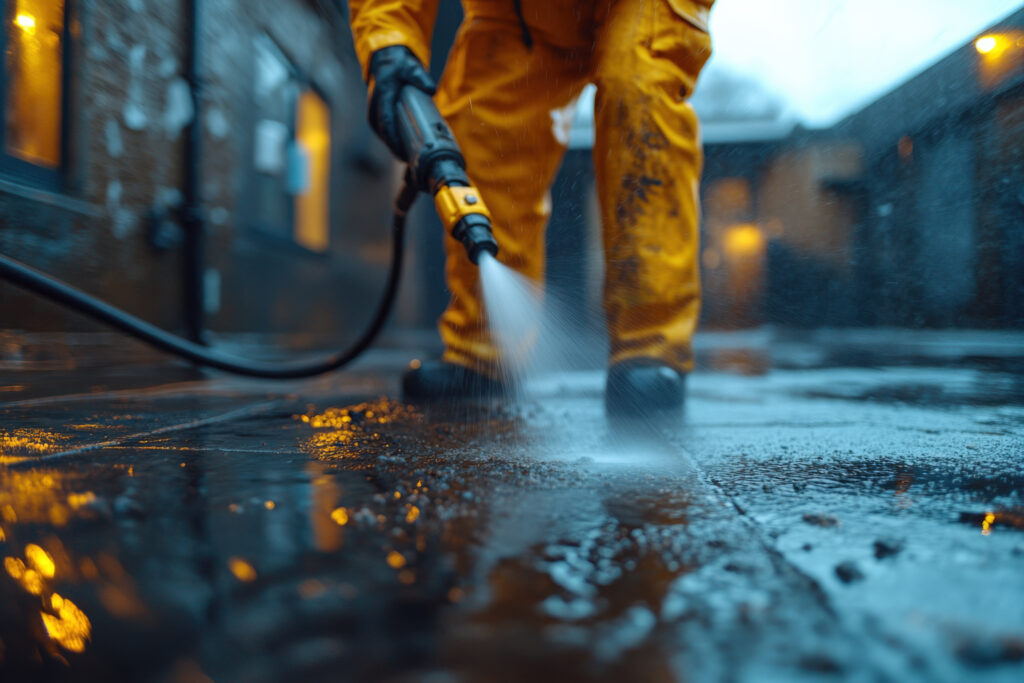
Cleaning Tiles With Power Washing
I learned this the hard way trying to clean my own driveway. Spent three hours with a cold water unit, and those oil stains from my ancient pickup truck didn’t budge an inch. Friend of mine came over with his hot water setup, and those same stains were gone in about ten minutes.
When Cold Water Actually Works Better
Don’t get me wrong – cold water pressure washing isn’t useless. There are plenty of times when it’s actually the smarter choice.
Your Paint Job Will Thank You
If you’ve got painted siding or a freshly stained deck, stick with cold water. Hot water can strip paint right off, and I’ve seen people ruin perfectly good deck stains because they thought hotter meant better. It doesn’t always work that way.
Same thing goes for washing your car. Your vehicle’s paint, all those rubber door seals, plastic trim pieces – none of that stuff was meant to handle water hot enough to brew coffee with. Cold water gets road grime and salt off just fine without turning your car wash into an expensive mistake.
Plus, cold water costs less to run. No heating bills, no waiting around for the water to get hot. For basic cleaning jobs, you’re throwing money away using hot water when cold would do the same job.
When You Need to Bring the Heat
But some messes just laugh at cold water, no matter how much pressure you throw at them.
The Stuff That Won’t Quit
Oil stains are the obvious one. Doesn’t matter if it’s from your car, the delivery truck, or whatever – petroleum products soak into concrete and stick around. Cold water just moves them around. Hot water actually dissolves them so you can wash them away.
Ever tried cleaning a restaurant patio with cold water? Good luck with that. All that grease from the kitchen, spilled food, years of foot traffic grinding everything in – you need heat to cut through that mess. I’ve watched people scrub for hours with cold water and barely make a dent.
Mold’s another big one. Sure, you can blast the black stuff off with cold water, but it’s coming right back because you didn’t actually kill it. Hot water takes care of the problem instead of just hiding it for a few weeks.
What Actually Works in Real Life
Here’s the thing nobody tells you – figure out what you’re really dealing with before you start. Is it just dirt and dust? Cold water’s fine. Is it grease, oil, or something that’s been there for months? You probably need heat.
I see people waste entire weekends because they picked the wrong method. They rent a cold water unit to clean their grimy concrete patio, then spend two days scrubbing and getting nowhere. Meanwhile, an hour with hot water would’ve had them drinking beer and admiring their clean patio.
Commercial places almost always need hot water because they deal with nastier stuff. Grease, food waste, chemical spills – that’s not coming off with garden hose pressure, no matter how fancy your equipment is.
The Bottom Line
Both methods work, but they work for different things. Cold water pressure washing handles regular cleaning jobs, costs less to run, and won’t damage sensitive surfaces. Hot water powerwashing tackles the gross, stubborn stuff that cold water can’t touch.
Don’t overthink it. Look at what you’re trying to clean. If it’s oily, greasy, moldy, or has been sitting there forever, you probably need hot water. If it’s just regular dirt and grime, cold water will do the job fine and save you some cash.
The worst thing you can do is pick the wrong method and waste a whole weekend getting nowhere. Trust me, I’ve been there.

